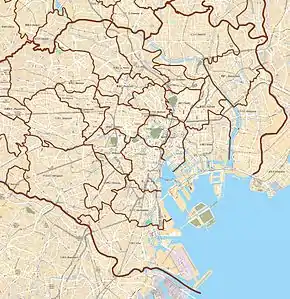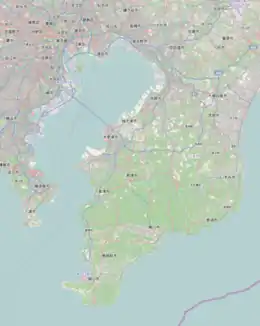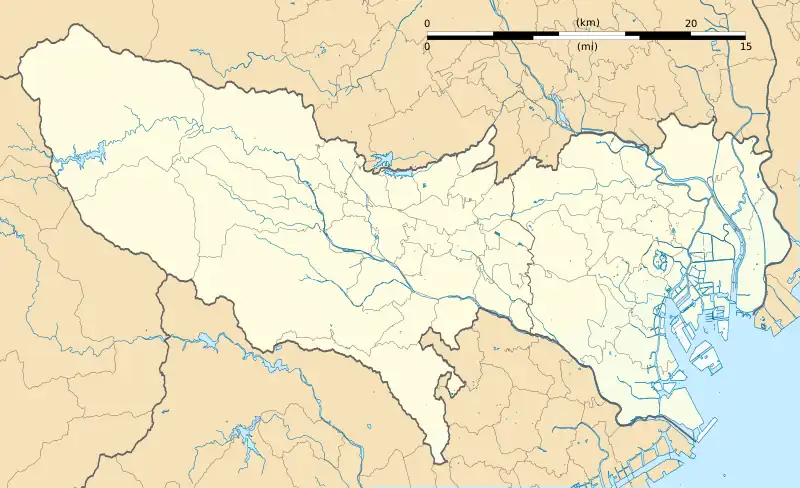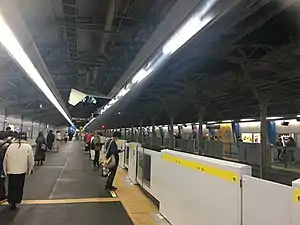Suidōbashi Station 水道橋駅 | |
|---|---|
 JR East exit, 2018 | |
| General information | |
| Location | Chiyoda and Bunkyō, Tokyo Japan |
| Coordinates | 35°42′07″N 139°45′14″E / 35.702°N 139.754°E |
| Operated by | |
| Line(s) |
|
| Connections | |
| Location | |
 Suidōbashi Station Location within Special wards of Tokyo  Suidōbashi Station Suidōbashi Station (Tokyo Bay and Bōsō Peninsula)  Suidōbashi Station Suidōbashi Station (Tokyo)  Suidōbashi Station Suidōbashi Station (Japan) | |
Suidōbashi Station (水道橋駅, Suidōbashi-eki) is a railway station which straddles Tokyo's Chiyoda and Bunkyō wards, operated jointly by East Japan Railway Company (JR East) and Tokyo Metropolitan Bureau of Transportation (Toei).
Lines
Suidōbashi Station is served by the following lines:
Station layout
Suidōbashi Station is divided into two parts: the JR East station and the Toei Subway station. There is no direct passage between the JR and Toei platforms.
JR East
JB17 Suidōbashi Station 水道橋駅 | |||||||||||
|---|---|---|---|---|---|---|---|---|---|---|---|
 The JR Chūō-Sōbu Line platforms in April 2022 | |||||||||||
| General information | |||||||||||
| Location | 2 Kanda-Misakichō, Chiyoda City, Tokyo Japan | ||||||||||
| Operated by | |||||||||||
| Line(s) | JB Chūō-Sōbu Line | ||||||||||
| Platforms | 1 island platform | ||||||||||
| Tracks | 2 | ||||||||||
| Construction | |||||||||||
| Structure type | Underground | ||||||||||
| Other information | |||||||||||
| Station code | JB17 | ||||||||||
| History | |||||||||||
| Opened | 24 October 1906 | ||||||||||
| Passengers | |||||||||||
| FY2013 | 85,320 daily | ||||||||||
| Services | |||||||||||
| |||||||||||
The JR East part of the station is located on an elevated viaduct and has two side platforms serving two Chūō-Sōbu Line tracks, with platform 1 being used by westbound trains and platform 2 being used by eastbound trains.[1] South of the platforms there are an extra two tracks for Chūō Line (Rapid) trains, which bypass the station non-stop. There are two exits from the station; the east exit is the busier of the two and features amenities such as a staffed "Midori no Madoguchi" ticket office, ticket vending machines, lockers, and toilets. The west exit has all of these amenities except the ticket office.[1]
Platforms
| 1 | JB Chūō-Sōbu Line | for Shinjuku, Nakano, and Mitaka |
| 2 | JB Chūō-Sōbu Line | for Ochanomizu, Kinshichō, Tsudanuma, and Chiba |
Toei
I11 Suidobashi Station 水道橋駅 | |||||||||||
|---|---|---|---|---|---|---|---|---|---|---|---|
 Toei Subway platforms, December 2019 | |||||||||||
| General information | |||||||||||
| Location | 1-3-42 Koraku, Bunkyō City, Tokyo (文京区後楽1-3-42) Japan | ||||||||||
| Operated by | |||||||||||
| Line(s) | I Mita Line | ||||||||||
| Platforms | 1 island platform | ||||||||||
| Tracks | 2 | ||||||||||
| Construction | |||||||||||
| Structure type | Underground | ||||||||||
| Other information | |||||||||||
| Station code | I-11 | ||||||||||
| History | |||||||||||
| Opened | 30 June 1972 | ||||||||||
| Passengers | |||||||||||
| FY2013 | 21,903 daily | ||||||||||
| Services | |||||||||||
| |||||||||||
The Toei Subway station has one island platform serving two tracks.
Platforms
| 1 | I Mita Line |
|
| 2 | I Mita Line | for Sugamo and Nishi-takashimadaira |
History
What is now the JR East station first opened on 24 October 1906.[2] The Toei Subway station opened on 30 June 1972.[3]

Passenger statistics
In fiscal 2013, the JR East station was used by an average of 85,320 passengers daily (boarding passengers only), making it the 49th-busiest station operated by JR East.[4] In fiscal 2013, the Toei station was used by an average of 21,903 passengers daily (boarding passengers only).[5] The daily average passenger figures (boarding passengers only) for JR East in previous years are as shown below.
| Fiscal year | Daily average |
|---|---|
| 2000 | 89,320[6] |
| 2005 | 87,040[7] |
| 2010 | 83,952[8] |
| 2011 | 82,133[9] |
| 2012 | 83,706[10] |
| 2013 | 85,320[4] |
Surrounding area
- Nihon University
- Surugadai University Ochanomizu Campus
- Senshu University Kanda Campus
- Chuo University Korakuen Campus
- Toyo Gakuen University Hongo Campus
- Tokyo University of Career Development Chiyoda Campus
- Tokyo Dental College Suidobashi Clinic
- Tokyo Dome City
- Kanda River
- Houbunsha
See also
References
- 1 2 Suidōbashi Station map JR East. Retrieved 15 January 2013.
- ↑ 日本国有鉄道停車場一覧 [JNR Station Directory]. Japan: Japanese National Railways. 1985. p. 52. ISBN 4-533-00503-9.
- ↑ Terada, Hirokazu (July 2002). データブック日本の私鉄 [Databook: Japan's Private Railways]. Japan: Neko Publishing. p. 215. ISBN 4-87366-874-3.
- 1 2 各駅の乗車人員 (2013年度) [Station passenger figures (Fiscal 2013)] (in Japanese). Japan: East Japan Railway Company. Retrieved 24 September 2014.
- ↑ 各駅乗降人員一覧 [Station usage figures] (in Japanese). Tokyo Metropolitan Bureau of Transportation. Retrieved 24 September 2014.
- ↑ 各駅の乗車人員 (2000年度) [Station passenger figures (Fiscal 2000)] (in Japanese). Japan: East Japan Railway Company. Retrieved 15 January 2013.
- ↑ 各駅の乗車人員 (2005年度) [Station passenger figures (Fiscal 2005)] (in Japanese). Japan: East Japan Railway Company. Retrieved 15 January 2013.
- ↑ 各駅の乗車人員 (2010年度) [Station passenger figures (Fiscal 2010)] (in Japanese). Japan: East Japan Railway Company. Retrieved 15 January 2013.
- ↑ 各駅の乗車人員 (2011年度) [Station passenger figures (Fiscal 2011)] (in Japanese). Japan: East Japan Railway Company. Retrieved 24 September 2014.
- ↑ 各駅の乗車人員 (2012年度) [Station passenger figures (Fiscal 2012)] (in Japanese). Japan: East Japan Railway Company. Retrieved 24 September 2014.
External links
- Suidōbashi Station information (JR East) (in Japanese)
- Suidobashi Station information (Toei) (in Japanese)